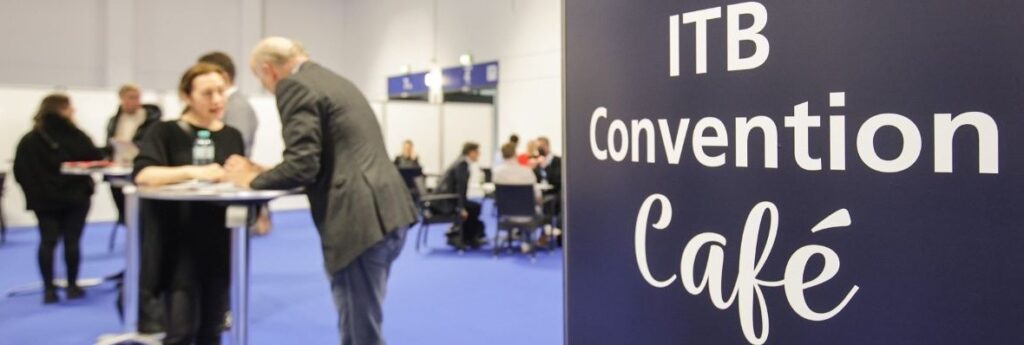All signs point to success for the travel industry in 2024, according to organizers of ITB Berlin, held in the German capital last week. Moreover, despite global crises, the industry showed its confidence at the world’s largest travel trade show, underpinned by evidence that people’s desire to travel appears unabated.
ITB Berlin recorded a slight increase with nearly 100,000 attendees – a result that exceeded expectations in the face of challenging strike circumstances. Diverse and globally represented, more than 5,500 exhibitors from 170 countries illuminated the three business days, occupying all 27 exhibition halls at the Berlin Exhibition Grounds.
“ITB Berlin once again mirrored industry developments. The mood among exhibitors, visitors and speakers was very positive throughout,” said Dr. Mario Tobias, CEO of Messe Berlin. “They generally agreed that people’s desire to travel is not just satisfying pent-up demand after the pandemic, but that it will remain basically stable. Neither inflation nor high energy prices appear to be curbing demand.”
Proof of the fact that the industry is a driving force for innovation was given not least by the ITB Berlin Convention, which took place parallel with the three-day show and featured high-profile attendees and a total of 400 leading international speakers at 200 sessions and 17 theme tracks discussing trends and innovations. All in all, around 24,000 attendees came to the panels, discussions, keynote speeches and lectures, again acknowledging the convention as the industry’s leading international thinktank.
Tourism community remains on course for success
The ITB Buyers Circle with its 1,300 senior buyers served as an industry barometer and underlined the importance of ITB as a leading business platform. Together with the management consultancy Dr. Fried & Partner, ITB Berlin compiled the new Global Travel Buyer Index. The survey asked several hundred Buyers Circle members about the economic mood and their business goals. The findings reflected a positive mood throughout regarding the market situation and provided an optimistic outlook for business over the next six months.
Great interest from the media and politics
Around 3,200 accredited journalists from 103 countries and over 300 bloggers reported on ITB Berlin. The show was once again a meeting place for politicians and diplomats from all over the world. In addition to numerous delegations, almost 80 ministers and state secretaries as well as 72 ambassadors visited this year’s ITB Berlin.
Thinktank
AI and its potential uses were a much-discussed topic. For the first time, the ITB Berlin Convention hosted a dedicated AI Track, which was well received by the event’s 24,000 attendees. It was generally agreed that no organization or company could any longer ignore AI.
Glenn Fogel, CEO of Booking Holdings, was certain that “generative AI can be of more assistance than real humans when customers are making their travel plans,” while Charuta Fadnis, SVP, Phocuswright, also acknowledged the growing importance of AI and personalized travel apps.
Convention participants also agreed that it was impossible to ignore climate justice and the skills shortage, for which there were promising solutions, however.
Jeremy Sampson, CEO of the Travel Foundation, appealed to the tourism industry to aim for net zero by 2030. His study entitled ’Envisioning Tourism in 2030 and Beyond’ outlines a dynamic path with a focus on regulating air travel and 40 measures in six categories for achieving sustainable tourism by 2050.
Challenges
In recent months, the invasion of Ukraine has been followed by another geo-political conflict in the Middle East, adding further uncertainty to the urgency of achieving sustainability. Ukraine, Israel, and Palestine all exhibited at ITB Berlin. At Israel’s press conference the tourism minister promoted travel to Israel and appealed for travel warnings to be dropped.
Following the pandemic and compared with 2023, this was the first time the industry registered a positive trend in the Asian-Pacific region. One example was China, which celebrated its return as an exhibitor this year and now welcomes visitors from selected countries by fast-tracking their visas.
All in all, the attendees at ITB Berlin were able to return home in positive expectation of this year’s developments and can look ahead to excellent business and a large volume of early bookings, especially for summer 2024.
“Despite all the euphoria and the positive outlook, the participants were all aware of the huge challenges also and in particular facing the travel industry. The ’Together’ in this year’s slogan underlines the fact that only community action can master the travel industry’s challenges.” Dr. Tobias concluded.
ITB Berlin 2025 will take place from Tuesday to Thursday, March 4-6.

